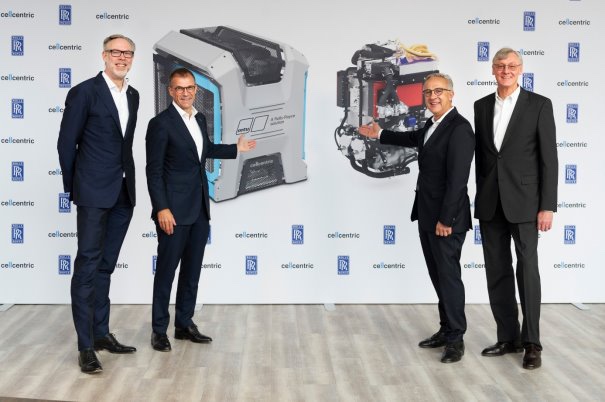cellcentric and Rolls-Royce seal the deal for emission-free energy supply with fuel cells

cellcentric and Rolls-Royce take the next step in their strategic cooperation for the use of cellcentric fuel cell modules. Rolls-Royce’s Power Systems division is developing CO2-free and climate-neutral mtu applications based on cellcentric fuel cells for emergency power supply for data centers, which emit only water vapor. Both partners agree that the technology and the time are now ripe for the successful commercial use of fuel cells in the high-volume mass market. A cooperation agreement to this effect has been concluded between the two companies, further joint applications of this future technology are under consideration. In general, the use of fuel cells is conceivable not only for emergency power supply, but also for covering peak loads and for continuous power supply.
In the future, the fuel cell aggregates with a net power of approx. 150 kW each will be the basis for scalable fuel cell systems in the megawatt range. This year’s commissioning of a demonstrator genset based on cellcentric fuel cell aggregates of the previous generation in a lower power class has already enabled initial tests, such as tests on dynamic behavior, wear, the integration of the fuel cell aggregates into the mtu genset, the analysis of the cooling as well as measurements on the interaction of several fuel cell aggregates. On the basis of the findings, continuous further development will be carried out aiming for the optimal integration of the cellcentric fuel cell aggregates into Rolls-Royce’s mtu gensets.
Still within this year, cellcentric is preparing to deliver further fuel cell prototype systems to Rolls-Royce. These are expected to be commissioned in 2022 in a further demonstrator unit before Rolls-Royce installs the first pilot systems at selected external customers in 2023. Commercial market launch of the series systems is already planned for 2025. Dr. Matthias Jurytko, CEO cellcentric: “The hydrogen-based fuel cell is a crucial building block to achieve the goal of a CO2-neutral society. With Rolls-Royce, we have an important partner at our side with whom we want to achieve further economies of scale to help the technology achieve a breakthrough. Our cooperation sends a clear signal to politicians and industry: both companies are convinced of the benefits of fuel cells and are working hard to commercialize them. The right framework conditions for this must therefore now be put in place. This applies in particular to the issue of infrastructure and thus the generation, storage and transport of hydrogen.”
Andreas Schell, CEO of Rolls-Royce Power Systems, emphasizes the extraordinary importance of the technology. “For us and our customers, gensets based on fuel cells are the next big step towards the energy revolution. We are investing a three-digit million sum in research and development for this over the next few years and hope that this strong commitment will encourage governments and politicians to promote and support this pioneering, extremely climate-friendly technology. As one of the world’s three largest suppliers of backup power for data centers, we will provide our customers with solutions that significantly reduce their carbon footprint. The cooperation with cellcentric will give us access to fuel cell aggregates that will further strengthen our position.”
Fully operational systems for series development – earlier series ramp-up possible
The cooperation with cellcentric offers Rolls-Royce the opportunity to use fuel cell aggregates from a leading manufacturer with a long history of development experience in the technology. The rapid deployment of a larger number of fuel cell units allows cellcentric to quickly ramp up series production of its own products for stationary applications. The use of cellcentric fuel cell aggregates in heavy-duty commercial vehicles of the parent companies Daimler Truck AG and Volvo Group is planned for the second half of the decade.




